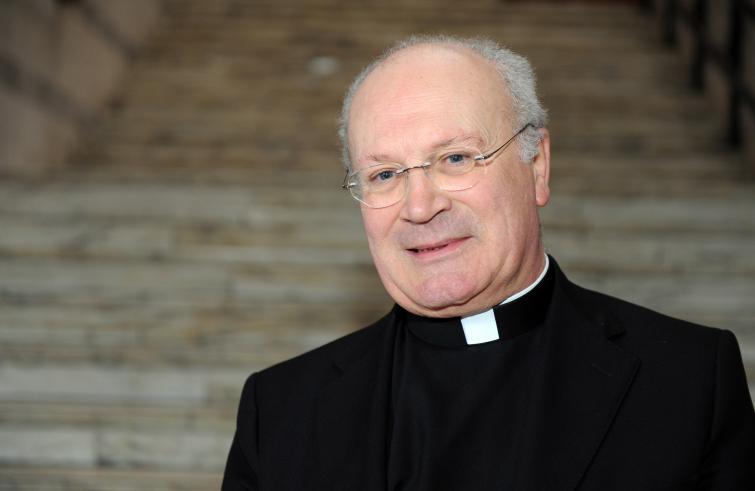
“Only those who do not overestimate themselves can reach the point of fasting”, said Msgr. Ermenegildo Manicardi, Rector of the Almo Capranica College seminary. For this Lenten period Msgr. Manicardi proposes “fasting from virtual platforms, and to avoid intruding into ‘friends’’ personal space that could be useful to others.” 
Prayer, almsgiving and fasting are the indivisible triune of Lenten practices: what is the specific place of fasting? I think we should draw inspiration from Matthew’s Gospel that ranks Jesus’ three requests as follows: almsgiving, prayer and fasting. Almsgiving is the primary approach. We start by opening our hearts to other people’s situations of concrete need and we give help, an extended hand, determined by the situation of need and by our possibilities. Prayer is at the heart of Lenten spiritual exercise.
Fasting is the addition of another perfection. It releases and enriches both almsgiving and prayer. In fact fasting can serve to increase what can be bestowed as a git, thereby stripping almsgiving from the category of what is inescapably scarce. Moreover, fasting serves to usher extended periods of prayer and further the onset of increasingly clear-minded prayer, more attuned to the poor and to the suffering that tears Christ’s flesh, embodied in battered humanity.
For Christians fasting and abstinence are connected not only with penance. They are also linked to “continence”, self-control, understood as the oneness of body and soul. Is it possible that contemporary humanity has lost this language and thus confuses fasting with a health-related practice? Fasting is always related to joy. We must remember that during Jesus’ earthly journey his disciples did not fast because He, the Spouse, was present: “Can the wedding guests fast while the bridegroom is with them? As long as they have the bridegroom with them, they cannot fast. The days will come when the bridegroom is taken away from them, and then they will fast in that day.” (Mark 2:19-20). After Jesus’ death and resurrection fasting gains new impetus for through fasting we express our unfulfilled presence in this world and we voice our anticipation of the marriage in the definitive world.
Fasting is also a reminder of an experience of continence, namely the need to temper and dominate our excessive, destructive appetites which occasionally afflict us. Through fasting we are crying out that we wish to be better persons and we commit ourselves in full to attain this goal.
We struggle so that our body may be more worthy of the Spirit that dwells in us. Thus we prepare ourselves to be worthier of the plan of resurrection that stands above us. We ought to welcome fasting with joy, anticipated in our self-relinquishment which, in part, we can still accomplish today.
For the believer, Jesus and his fight against Satan’s temptation during the 40 days in the desert, constitute our role model of fasting. Is Lent also a time to seriously acknowledge the presence of evil and of Satan – a recurring theme in Pope Francis’ magisterium – in a world that tends to relativize even violence and war? Fasting teaches us that giving in to gluttonous temptations is not a healthy practice. Through fasting we learn that by mastering ourselves we extend our field of action. We thereby discover
Our space is also occupied by evil, by our enemy Satan,
that exposes us to temptation and attempts to restrict our vital space, making us slaves of a world we kept within bounds with mean choices, such as believing only in material bread.
We are fasting only when the world is viewed through critical lenses and we accept, with determination, to break the spiral of narrow-minded self-centredness. When this happens violence and war become clearly visible.
When our eyesight will be sufficiently sharp, these terrible realities will be identified as the tragic and gloomy extension of our own egocentricities. Only then will we truly engage in the fight against violence and war, with the effectiveness of our strength reinforced by the World of God.
In this year’s message for Lent the Pope guards against “false prophets” and “snake charmers”, against the deceit of vanity and of a fully virtual existence. From what, and how, should the young fast? The virtual realm is an amazing, fascinating dilation of our world. However, it also encompasses the danger of turning into a false expansion, conducting many of us in a purely imagined world, beautiful inasmuch as it is unreal.
There is need for more clear-minded, cogent discernment that is nourished also by fasting from the virtual realm. We need to set a distance.
For example ever more often some take aback their interlocutors because they are distracted and are busy typing their keyboards while they are being spoken to. We may not realize it, but sometimes we cause suffering in those who are trying to communicate with us. The areas of healthy solitude have tragically decreased while the power to reach us, distract us, subdue us and reject those who are physically near us, has surged… The risk is the diminuition of the areas of prayer. I think we should all step up our commitment to fast from disorders in our relations that wither our dialogues and deplete our relations with our neighbours and with the Lord.










